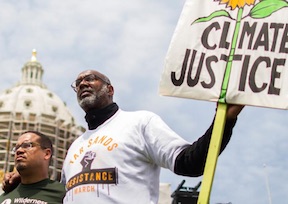By David Kowalski
Excess greenhouse gas in the atmosphere caused by burning fossil fuels - coal, oil, or natural gas - is now resulting in dangerous global warming. Fifteen of the sixteen warmest years have occurred since the year 2000. 2014 set a new record and 2015 topped it. 2016 is on track for even more extreme warming, with January through June showing record-breaking global temperatures (NASA graph, below).
[Click image to enlarge]
Burning fossil fuels emits carbon dioxide (CO2), a greenhouse gas that traps heat and is raising Earth’s temperature. Human-caused CO2 levels in the atmosphere are now about 40% greater than the highest levels detected in Nature in the past 650,000 years (NASA graph with annotations by D.K., below).
We are now in uncharted territory. Human activity, specifically the burning of fossil fuels, is generating more CO2 gas than Nature can absorb from the atmosphere.
The persistent accumulation of CO2 in the atmosphere, which began with the Industrial Revolution, is raising the temperature of our planet. This is certainly cause for alarm, since rising global temperatures are impacting weather patterns, driving climate change and having dire consequences.
It’s Getting HOT in Here!
Nowhere is the fingerprint of climate change more evident than with extreme heat.
This year, summer got it's hottest start ever in three states: California, New Mexico and Arizona. Over 30 million people were under heat warnings or advisories. Record-shattering temperatures of 109° occurred in Los Angeles and 122° in Palm Springs. Tragically, on June 20th, six people died outdoors in 118° heat in Arizona. Between 600 and 1,500 heat-related deaths occur in an average summer in the U.S.
Heat waves last for days and are deadly. Severe heat waves in Europe in 2003 and Russia in 2010 resulted in tens of thousands of deaths. In 2015, thousands died in heat waves that occurred in India and Pakistan. A Chicago heat wave with temperatures up to 104° killed nearly 750 people in 1995. A California heat wave with temperatures as high as 119° caused up to 450 deaths in 2006.
A combination of heat and humidity (the
Heat Index) that makes it feel like it’s 105° or hotter is termed a ‘danger day’. Warming temperatures are about to push U.S. cities into a new mode where danger days happen regularly. By 2030,
84 cities with nearly one-third of the U.S. population are projected to deal with at least 20 danger days annually if carbon emissions continue unabated. In the South, Miami is projected to have 126 danger days by 2030.
Buffalo is projected to have fewer danger days (6) by 2030, but the number will increase to 15 by 2050 if carbon emissions continue unabated. By 2030, Buffalo is projected to have 38 ‘extreme caution’ days, when the heat index tops 90°. The latter days are the greatest threat to children and the elderly, who are more sensitive to the heat, and to those in residences without air conditioning.
Cutting carbon emissions worldwide is vital to reducing the risk of heat-related death and illness.
Drought, Flooding, Wildfires and Extreme Weather
Higher temperatures increase the amount of moisture that evaporates from land and water, and have contributed to drought in some areas. At the same time, increased water vapor in the atmosphere caused by the elevated warming has resulted in heavy downpours in other areas.
Extreme events linked to global warming and predicted earlier by climate scientists are in fact occurring now around the world and here at home: unprecedented drought in California, destructive downpours and historic flooding in Texas and West Virginia, more intense hurricanes like Sandy in New York, and raging wildfires in the Southwest U.S. and in Canada.
Drought, flooding and excess heat threaten human health and safety. Such events can also cause crop destruction, food insecurity and human conflicts, threatening our ability to sustain life on this planet.
Ocean Warming, Ice Melting, and Sea-level Rise
Oceans, which cover 70% of our planet, are absorbing 93% of the excess heat of global warming. Hot ocean waters are bleaching and killing coral reefs, disrupting ecosystems that harbor fish, an important food source. Continued warming of oceans will increase melting of polar ice sheets, cause extensive sea level rise and flood coastal cities, including New York City and Miami. This would be catastrophic -- displacing large populations, causing unrest and costing trillions of dollars. Low-lying island nations face the threat of being swallowed by rising seas.
What Can YOU Do?
There is no doubt that global warming and climate change are happening now. We all need to take action locally to help end human-caused global warming.
It is essential that we push our governments at national, state and local levels adopt measures to prevent the worst impacts of global warming. Bold energy policies with mandates and timelines are urgently needed to shift to clean, renewable energy, increase energy efficiency, and cut carbon emissions that cause global warming.
Let your elected officials know that ending global warming pollution by transitioning to clean, renewable energy also presents real opportunities. It will not only stabilize the climate and energy prices, but also lead to good-paying jobs, healthier communities and a more just society.
And don't forget to Vote! Vote for candidates who seek to protect People and the Planet.
Get more informed and involved with activists in the
Sierra Club Niagara Group through monthly Executive Committee meetings, presentations/discussions at a Writers Group, and a Climate & Energy Committee meeting (Email:
NiagaraSierra@gmail.com)
Join one of the groups affiliated with the
Climate Justice Coalition of Western New York, including faith groups, labor unions, social/economic justice groups, Working Families Party and others. For more information, Email
ClimateJusticeBuffalo@gmail.com.
Request a presentation on Environmental Stewardship, Climate Change and Clean Energy Solutions for your group. Email
ClimateJusticeBuffalo@gmail.com
 York State Department of Health. His background and experience includes more than three decades of environmental activism and over 25 years as a Sierra Club volunteer leader where he has worked diligently for environmental justice.
York State Department of Health. His background and experience includes more than three decades of environmental activism and over 25 years as a Sierra Club volunteer leader where he has worked diligently for environmental justice. York State Department of Health. His background and experience includes more than three decades of environmental activism and over 25 years as a Sierra Club volunteer leader where he has worked diligently for environmental justice.
York State Department of Health. His background and experience includes more than three decades of environmental activism and over 25 years as a Sierra Club volunteer leader where he has worked diligently for environmental justice.





